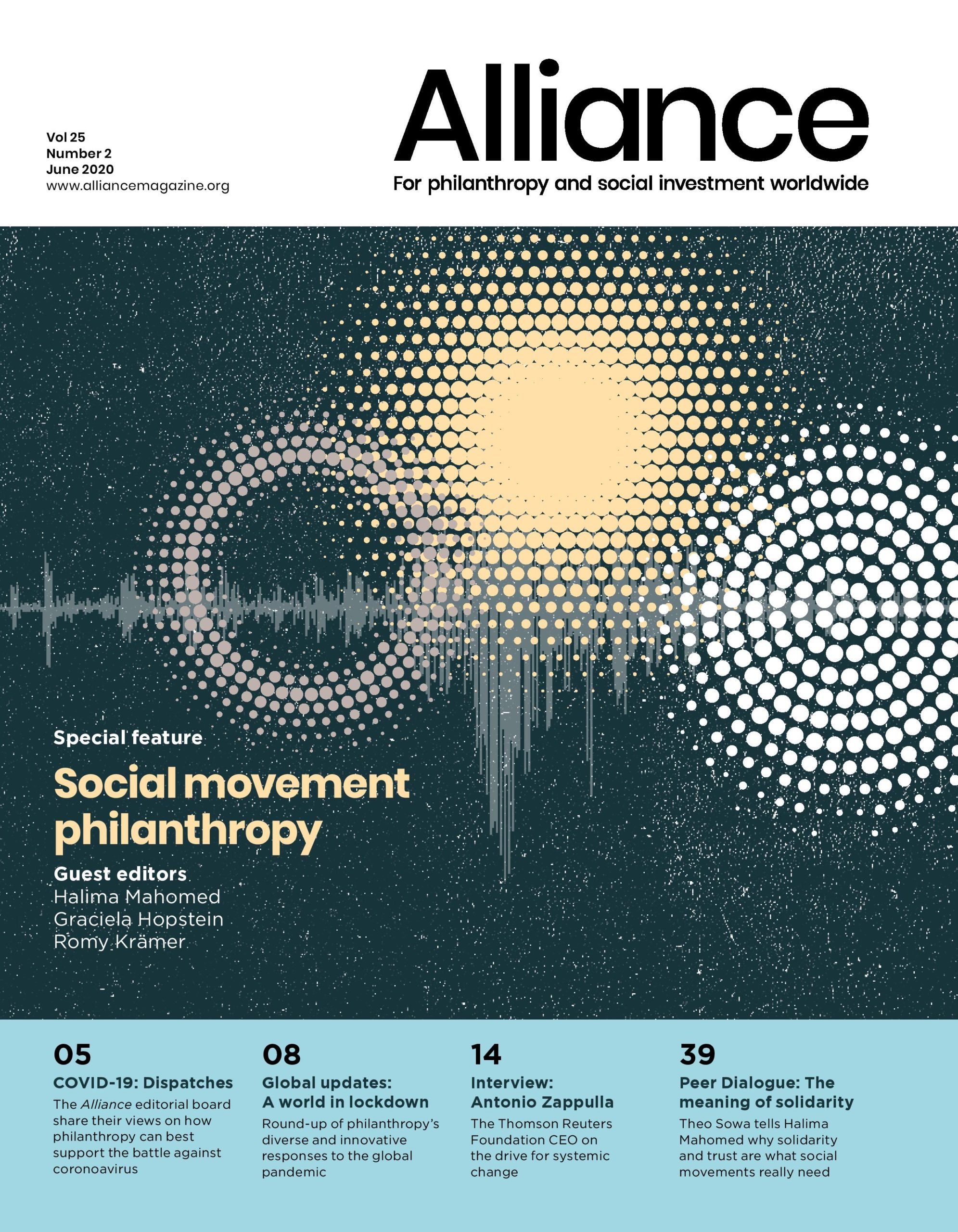It has been an extraordinary and terrifying start to the new decade as countries around the world face up to the COVID-19 pandemic. The following are edited excerpts of a conversation between a global group of members from our editorial advisory board in March 2020 about what philanthropy needs to do to support the frontlines of the crisis.
China
TAO Ze writes: Yishan is the China Philanthropy Data Center. We are building a data platform to track the donation flows for coronavirus. So far, we have registered over 34,000 grantmakers and 4,500 public charities who are fighting the virus in China. Over $4 billion has been donated in the past two months. Now we are working on the data analysis of the donors’ strategy and how the charities spend the money.
India
 Ingrid Srinath writes: The economic downturn is, of course, likely to have a severe impact on corporate philanthropy which has been a source of some support to non-profits in the past five years since contributions were made mandatory. To exacerbate the situation, an amendment proposed by the government to the Companies Act may disqualify large numbers of non-profits from receiving such funds and there are other changes in this year’s national budget that will affect tax exemptions. India Development Review has published a quick round-up of social sector responses to the crises.
Ingrid Srinath writes: The economic downturn is, of course, likely to have a severe impact on corporate philanthropy which has been a source of some support to non-profits in the past five years since contributions were made mandatory. To exacerbate the situation, an amendment proposed by the government to the Companies Act may disqualify large numbers of non-profits from receiving such funds and there are other changes in this year’s national budget that will affect tax exemptions. India Development Review has published a quick round-up of social sector responses to the crises.
South Africa
 Halima Mahomed writes: I fear we are in for a very rough ride… we are anticipating a massive spread once it hits spaces like densely populated informal settlements where isolation is not a feasible option and safety nets are few. We are extremely worried about what will happen once the pandemic intersects with a population that has high rates of HIV and TB infections. The reality is that it is those who have privileged positions of remote working and resources to cope – a minority of the population – who can take the measures needed as fully as they need to be taken.
Halima Mahomed writes: I fear we are in for a very rough ride… we are anticipating a massive spread once it hits spaces like densely populated informal settlements where isolation is not a feasible option and safety nets are few. We are extremely worried about what will happen once the pandemic intersects with a population that has high rates of HIV and TB infections. The reality is that it is those who have privileged positions of remote working and resources to cope – a minority of the population – who can take the measures needed as fully as they need to be taken.
Slovakia
 Boris Strecansky writes: There has been a strong response from civil society and the corporate sector, with over 30 various initiatives. It is clear that coordinated and robust support from state institutions will be the main backbone of the response, but civil society will play a crucial complementary role in organisation and delivery at the level of municipalities and communities. The experience of philanthropic institutions – in the Slovak context this means a couple of intermediary independent foundations, a handful of private venture philanthropies, several dozen corporate foundations and eight community foundations – with experience of serving and connecting various needs, mobilising and ensuring the flow of resources and providing the outlook for the post-peak crisis period will be very important.
Boris Strecansky writes: There has been a strong response from civil society and the corporate sector, with over 30 various initiatives. It is clear that coordinated and robust support from state institutions will be the main backbone of the response, but civil society will play a crucial complementary role in organisation and delivery at the level of municipalities and communities. The experience of philanthropic institutions – in the Slovak context this means a couple of intermediary independent foundations, a handful of private venture philanthropies, several dozen corporate foundations and eight community foundations – with experience of serving and connecting various needs, mobilising and ensuring the flow of resources and providing the outlook for the post-peak crisis period will be very important.
Brazil
 Marcos Kisil writes: We are living in a time to bring together grantmakers, social entrepreneurs, and social investors to create a voluntary effort to cope with the major crisis that the world is facing. This turbulent time is testing all of us, and we are all in uncharted waters. Social investors are well placed to ensure that the undoubted negative social and economic challenges brought by COVID-19 can be addressed effectively. In matching with government and business leaders, we can be part of a new society where solidarity, cooperation, and new opportunities can stress the importance of wealth redistribution as a moral endeavour of all.
Marcos Kisil writes: We are living in a time to bring together grantmakers, social entrepreneurs, and social investors to create a voluntary effort to cope with the major crisis that the world is facing. This turbulent time is testing all of us, and we are all in uncharted waters. Social investors are well placed to ensure that the undoubted negative social and economic challenges brought by COVID-19 can be addressed effectively. In matching with government and business leaders, we can be part of a new society where solidarity, cooperation, and new opportunities can stress the importance of wealth redistribution as a moral endeavour of all.
Colombia
 Carolina Suárez writes: This crisis is dramatic, but also, like all events in life, it represents an opportunity to strengthen the importance of human values, such as solidarity, integrity, humility and transparency. All of us working in philanthropy have the privilege of seeing the world through a different lens, and now, more than ever, we need this vision of ‘the love of humanity’ and the capacity to innovate in the way we tackle this systematic crisis, taking risks, with courage and in collaboration.
Carolina Suárez writes: This crisis is dramatic, but also, like all events in life, it represents an opportunity to strengthen the importance of human values, such as solidarity, integrity, humility and transparency. All of us working in philanthropy have the privilege of seeing the world through a different lens, and now, more than ever, we need this vision of ‘the love of humanity’ and the capacity to innovate in the way we tackle this systematic crisis, taking risks, with courage and in collaboration.
Germany
 Volker Then writes: It’s rewarding to see that many people are developing small, informal signs of solidarity and offers of support to those in need and showing that humanity is not what some politicians call ‘putting yourself first’.
Volker Then writes: It’s rewarding to see that many people are developing small, informal signs of solidarity and offers of support to those in need and showing that humanity is not what some politicians call ‘putting yourself first’.
Dietmar Hopp is co-founder of SAP, a substantial philanthropist, and the majority owner of Curevac, a medical start-up company doing very promising research into a corona vaccine. Hopp has categorically refused an approach by the US government to buy the company at a price, according to reports, of $1 billion to secure the potential vaccine for exclusive US use.[1] Hopp has clearly said that any success in vaccine development by his company will be for all of humanity and not for anyone’s exclusive use.
 Michael Alberg-Seberich writes: Every crisis also creates opportunities. In this case, the digitalisation of the philanthropy sector will leapfrog ahead because of the limits the disease imposes on physical contact. We are now seeing web conferences and workshops everywhere. It is amazing how quickly people adapt, and share tools and experiences. The federation of German Foundations is also active in the crisis.
Michael Alberg-Seberich writes: Every crisis also creates opportunities. In this case, the digitalisation of the philanthropy sector will leapfrog ahead because of the limits the disease imposes on physical contact. We are now seeing web conferences and workshops everywhere. It is amazing how quickly people adapt, and share tools and experiences. The federation of German Foundations is also active in the crisis.
Belgium
 Catherine Lennon writes: At the European Foundation Centre, I have seen a tremendous demonstration of solidarity and strength, resilience and responsiveness from colleagues and members alike and our wider community, not least other members of Alliance’s Editorial Board. The past weeks have demonstrated that irrespective of differences in geography, organisation, language or culture we are a community, and together we can overcome any issue put in front of us, and while we may be self-isolated, we are far from being alone.
Catherine Lennon writes: At the European Foundation Centre, I have seen a tremendous demonstration of solidarity and strength, resilience and responsiveness from colleagues and members alike and our wider community, not least other members of Alliance’s Editorial Board. The past weeks have demonstrated that irrespective of differences in geography, organisation, language or culture we are a community, and together we can overcome any issue put in front of us, and while we may be self-isolated, we are far from being alone.
At the EFC, in addition to the measures that we have all been forced to take such as teleworking, holding virtual events, and much more effectively using our plethora of online tools, we also launched a survey to gain an understanding of our sector’s response to the crisis – the results of which will be the basis for a pledge from the sector. We have been amazed at the speed with which our members have put together a wide range of coalitions, strategies and mechanisms from research and vaccine funding to support the most at-risk populations.
US
 Lucy Bernholz writes: US philanthropy media is reporting that a small number of the big foundations are relaxing reporting rules, shifting to general operating support and to those funding pandemic research. It does seem like this could be a silver lining – a shove that helps more foundations recognise the value of core support, but I feel like it’s such a small group of funders out of such a huge number.
Lucy Bernholz writes: US philanthropy media is reporting that a small number of the big foundations are relaxing reporting rules, shifting to general operating support and to those funding pandemic research. It does seem like this could be a silver lining – a shove that helps more foundations recognise the value of core support, but I feel like it’s such a small group of funders out of such a huge number.
More interesting than what foundations are doing – in my opinion – is the rebirth of mutual aid and collective care, aided by payment apps, spreadsheets, while social media people are setting up emergency funds all over the place.
UK
 Barry Knight writes: The Conservative Government has swallowed its neoliberal pride and is nationalising the economy. While many have welcomed this, there is almost no recognition of the role of civil society, which has sprung into action. Covid-19 Mutual Aid UK has recorded the formation of 900 local groups designed to help vulnerable people in the economy. We have begun to study civil society and philanthropy both in the UK and internationally focusing on practical solutions that will enable people to get through this process and ‘build back better’. For the moment, people have lost their vision of what a good society might look like and merely want to get back to where they were. However, there is a cadre of organisations that are working on the long-term and we are doing our best to support those efforts.
Barry Knight writes: The Conservative Government has swallowed its neoliberal pride and is nationalising the economy. While many have welcomed this, there is almost no recognition of the role of civil society, which has sprung into action. Covid-19 Mutual Aid UK has recorded the formation of 900 local groups designed to help vulnerable people in the economy. We have begun to study civil society and philanthropy both in the UK and internationally focusing on practical solutions that will enable people to get through this process and ‘build back better’. For the moment, people have lost their vision of what a good society might look like and merely want to get back to where they were. However, there is a cadre of organisations that are working on the long-term and we are doing our best to support those efforts.
This article was first published in Alliance extra on 24 March 2020.






Comments (0)